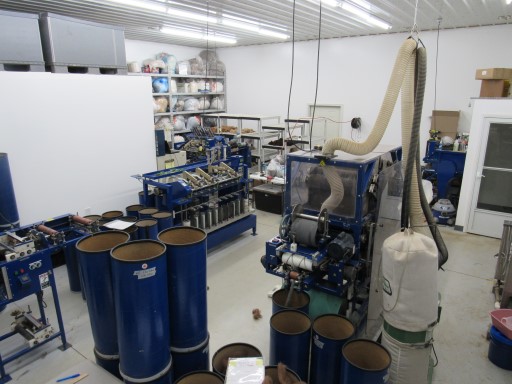
Our fiber mill utilizes primarily Belfast Mini Mills equipment which has been operational since February 2018. We are very proud of our addition and welcome you to a schedule a tour.
- Full service mill specializing in alpaca and alpaca blends
- Creating artisan products; yarn, rug yarn, roving, batts and wet felt sheets from your fiber
- Easy online order submission including estimated cost per batch and completion date
- Option to pre-schedule your processing date
- Ship, deliver to mill or pick a designated drop off/pick up location, which ever is easiest for you
- And always, feel free to call with any questions
We are currently scheduling new orders to start in February 2025. In order to serve our customers better and to help control our backlog, we are no longer accepting new customers. If you would like to be added to our wait list please contact Ruth Anne Goss at 256 509-5096.
Fiber Processing - The Two Roots Fiber Mill Way
At Two Roots Fiber Mill our goal is to provide the best customer service possible. The order submission process makes it easy to create an order, know what it will cost and when the order will be completed.
Order process:
1. |
Create an account and an order using our website. This process provides the ability to describe each batch, the final product desired and estimates the cost of each batch. |
2. |
The website will retain the information you have entered so you can add, modify and remove batches and final product definitions until your order is submitted. If you are not able to complete your order and batch definitions today don't worry. It will be on our system when you have time to work on it again. You can also use this tool as a cost estimator. Simply remove the order when you are done. |
3. |
Two Roots Fiber Mill will analysis your order and schedule the work. This will identify the date when your fiber needs to received and when we expect to complete the order. Part of this process is a manual activity on our side so this may take up to 2 business days for us to complete. If we have any questions related to your order we will contact you be email or telephone based on your contact preference. |
4. |
At each step of the process, Two Roots Fiber Mill will be updating information related to your order. This information will be available on our website. Simply login to your account and review your orders. |
5. |
There is also a tutorial (slide presentation) on the Two Roots Order Processing workflow. By default, the presentation will run automatically but if you wish you can control speed of the presentation using your mouse or finger. Have a look at the tutorial here. |
Fiber Types
As owners of Two Roots Alpacas, we have lots of experience with alpaca fiber and the various ways that it can be blended. We also have some experience with a number of sheep breeds as well as Angora goats. If your fiber is not listed as an option in our fiber lot or group pages please select the other option and we'll contact you to discuss how we can proceed.
Skirting
Processing starts with skirting your fiber. The cleaner the fiber, the better the product. For information on skirting, visit Fiber Preparation. Please do not send fiber that has tags (dung or stained wool) in it. If your fleece is not properly skirted when received it will be rejected. We cannot stress enough how important this step is to have done in order to create a quality end product.
Incoming Weight
Each batch of fiber will be weighed when received. This gives a base weight for calculating fiber loss per batch. We require a minimum 3 pound batch, which can be a single fleece or multiple fleeces combined to be processed together. If fleeces are combined make sure grade and staple length are comparable.
Processing Options
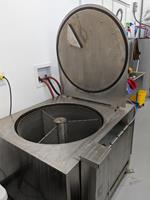
Washing
All incoming fiber is tumbled and washed. This step is important to ensure consistent quality in the end product. Each batch of fiber
receives a soak cycle, 1-2 wash cycles and 2-3 rinse cycles using earth friendly products. If your fiber requires more than 2 washes there
will be an additional charge but we will contact you first to let you know.
Washing is priced based on the incoming weight of the fiber.
Picking
Regardless of your end product, all fiber goes through the picker which removes any tangles and opens the individual locks. Blending of fibers may begin here. The washing process removes oils, so conditioning agents are put back into the fiber to reduce static and improve its ability to process through the equipment. If the service of tumble wash dry pick is all you want then no conditioning agents are added to the product.
Fiber Separator
The fiber separator is a machine that uses centrifical force to remove heavier fibers from the fleece. When a fleece contains a large number of guard hairs or if the fleece has an excessive amount of vegetable matter, a pass through the fiber separator can remove these undesirable traits. This process is not without a cost. When we run the fiber separator fast enough to remove the undesirable traits from the fleece it will also take some good fiber as well. That is, there can be a significant lost of lot weight when the fleece is passed through this machine.

Carding
The carder is the heart of the mill. It aligns the individual fiber strands to produce roving and batts that may be used as final products or go on to subsequent steps. Blending may also be done during the carding process. If you want the fallout from the carding process returned to you, please indicate this when you place the order.
Batts
Batts are generally 24” x 48” and are used in this form or further processed into felt. If batts are created to produce wet felted sheets the price of the batt is included in the price of the wet felted sheet.
Roving
Roving is a long, narrow bundle of carded fiber which can bagged in bulk or wound into center pull bumps.
Roving is priced on
picked weight if this is the final product. If further processing is requested the cost of roving is included in that product price.
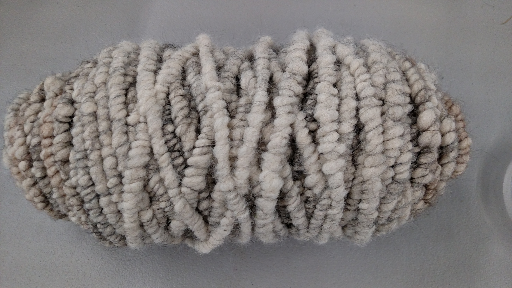
Rug Yarn
Rug yarn can be made from any fiber that is 2” to 6” in length. This is a great use for “seconds” or clean “thirds”. It takes
about 4 pounds of fiber to make one rug yarn bump. The bumps are 125 yds, have a cotton core and generally make a 2’ x 3' rug.
There are a number of options when producing rug yarn.
- Type of core. By default we will use a cotton core. If you desire a different core please contact us.
- Color options include solid, variegated, or color wrapped.
- The number of yards in the bump up to 125 yards
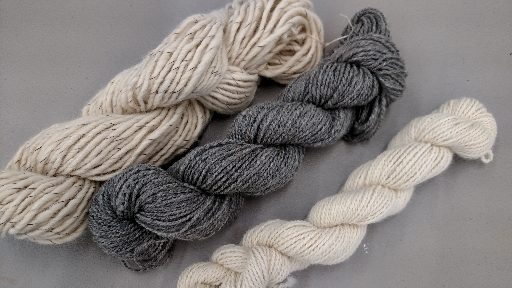
Spinning
Prior to spinning, the roving is processed through the drawframe. Rovings may pass through two or more times to blend and lengthen. Each successive pass through the drawframe averages any thick or thin sections to create a more uniform roving for spinning.
The spinner takes roving that has been through the drawframe and spins it into single ply on bobbins. The thickness of the ply
produced depends on the desired yarn weight, i.e. Fingering, Sport, DK, Worsted, Lopi style or Bulky. We base the yarn weight
on a single at yards/pound.
Given the variations of natural fibers and range of possibilities it is
always good to send us a sample of the weight you want produced.
All yarn products are packaged in skeins.
Plying
Plying combines singles from the spinner together to create 2, 3 or 4 ply yarn. It is at this stage that interesting blends can be created using different singles to create an artisan final yarn. There is an addition cost for 3 and 4 ply yarns.
Steaming
All yarn (except rug and lopi style) can be run through the steamer to stabilize the structure of the yarn, i.e. “set the twist”. This step also adds softness and loft. There is an additional cost for steaming (fulling) which is based the finished weight.
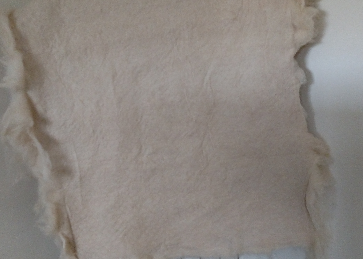
Wet Felted Sheets
The felt maker creates felted products using batts, and sometimes roving, from the carding process. Felting is the process of interlocking fibers with each other to create a durable mat of material. The wet felted sheet is 2x4 and can be 2 to 3 pounds. For custom products please contact us.
Blending
There are numerous blending possibilities when working with natural fibers. Here is a brief list to start you thinking about how to best enhance your fiber.
- Tonal Blending. Tonal blending when performed at the picker will create a new color. For example, if you blend a white fiber with a black fiber the result would be a shade of grey.
- Variegated Blending. Variegated blending when performed at the carder will produce an output that changes it color along it's length. We can create this type of core spun rug yarn and believe that it would also be possible with a Lopi style yarn.
- Material Blend. A material blend enhances the output product by introducing additional properties in the output that would not be present in the native fiber. For example, adding Merino wool to Alpaca will enhance the felting properties. Adding huacaya alpaca to suri alpaca allows you to produce a yarn without the addition of "glue" to help the suri form into a yarn.
For all blending request please contact us so that we can produce the output you desire.
Deposit
A 10% deposit based on your estimated total cost, is required at the time of scheduling a processing slot.
Payment
All orders should be paid in full before shipping or pick-up. Shipping costs are the responsibility of the customer. Any outstanding order that is not paid within 60 days becomes the property of Two Roots Fiber Mill.
We offer a 5% discount on orders over $500 to all AOA paid (Registry/Association) members or TAA members. Proof of membership is required.